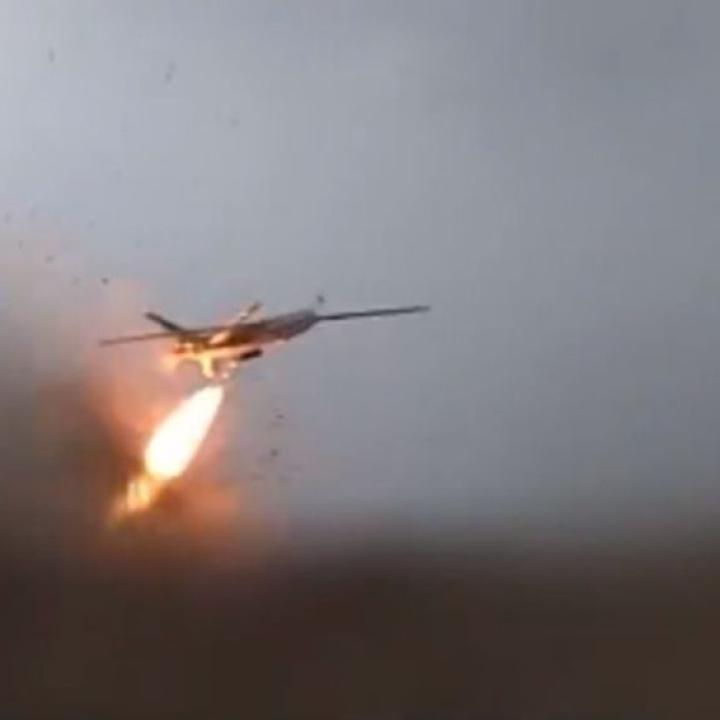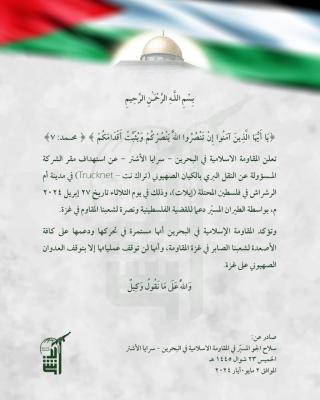
Is Kataib Hezbollah Behind Saraya al-Ashtar's Claimed Attack on Israel?

The connection between exiled Bahraini terrorists and Iraq's Kataib Hezbollah is demonstrably strong and probably explains the strange incident.
On May 2, the U.S.-designated, Iran-backed Bahraini terrorist group Saraya al-Ashtar (SAA) claimed to have undertaken a drone attack days earlier against the Israeli company Trucknet, based in Eilat. The group threatened to conduct more attacks as long as the Israeli incursion continues inside Gaza (Figure 1).
Video from the April 27 drone launch was posted on various social media accounts linked to Bahraini militias, including al-Abdal. The footage shows a number of interesting details:
- A Sammad-type (KAS-04) V-tail drone being launched at dusk, with a grey-white mottled exterior (Figure 2). This type of Iranian drone has been seen less often in Iraq and Syria but has previously been connected to attacks by the Iraqi muqawama (resistance) group Kataib Hezbollah (KH).
- SAA's flag planted by the launch site.
- A sticker showing four SAA members, applied to an electronics case and to the drone's wings and nose (Figure 3). The launch team also wore snazzy t-shirts with the same four-man montage—definitely the most accessorized terrorist launch cell seen to date. The four men are Ridha al-Rida al-Ghisra, Mahmoud Yousif, Mustafa Yousif, and Ahmad al-Malali, all of whom were involved in a past breakout operation at Jau Prison near Manama. The first three were shot dead by Bahraini security forces while trying to escape to Iran by boat in February 2017; the fourth was arrested and executed in July 2019.
Probable Iraqi Attack Dedicated to the Bahraini Group
The open terrain and leisurely launch sequence makes it all but impossible that this drone was launched from Bahrain, a small island where it is difficult for Iran and SAA to smuggle even light weapons. More likely, Iraqi militias facilitated or even conducted the launch while dedicating it to SAA, presumably in a bid to keep the group's dimming brand alive.
Earlier this year, KH made another effort to revive the brand with comments about the future of "resistance" in Bahrain. On January 9, al-Mayadeen TV interviewed KH military spokesman Jafar al-Husseini, who was sanctioned by the U.S. government in 2023 for “coordinating with KH fighters planning attacks against U.S. military commanders in Iraq.” He declared, “We also have the resistance in Bahrain and Hejaz [Saudi Arabia]. Even though their presence is not clear now, it will be more visible in the coming years and the coming confrontations.” So far, this "visibility" amounts to pretending that Bahraini groups are still able to undertake real-world contributions to the "axis of resistance."
KH and SAA have a long-running connection. In March and August 2015, senior Bahraini security officials went on record stating that KH had provided training on armor-piercing explosively formed penetrators at a camp in Iraq and “offered logistical and financial support” to SAA. In March 2017, Bahraini security agencies linked a deadly March 3, 2014, explosion in Manama that killed three policemen (including one Emirati advisor) to a SAA cell that had been trained and equipped by KH at Iraqi bases. On March 17, 2017, the United States sanctioned SAA and a number of its leaders as Specially Designated Global Terrorists (the group is often listed as al-Ashtar Brigades or AAB in U.S. terminology). And on March 12, 2024, Washington added four new SAA members to its Specially Designated Nationals list—a possible driver behind the April 27 attack claim.
An Attack on Gulf-Mediterranean Logistics
The target of the claimed April 27 launch was noteworthy as well: the Israeli firm Trucknet is linked to the India-Middle East-Europe Economic Corridor (IMEC), a proposed trade route that would link Gulf Cooperation Council ports to the Mediterranean region via Jordan and Israel. This would make it a direct competitor to the Development Road project, which would send trade from Iran and Iraq through Turkey and Syria and on to Europe and the Mediterranean from there. Iraqi terrorist groups such as KH, Asaib Ahl al-Haq, and the not-yet-designated Badr Organization appear highly invested in the Development Road, whose local commercial benefits they are poised to dominate.
On April 1, KH security chief Abu Ali al-Askari claimed that his group “has prepared to arm the Islamic Resistance in Jordan” and would seek “to cut the road that reaches the Zionist Entity” as a first step in this effort. Unless these Iraqi muqawama groups are checked, they will likely use drone strikes and other means to hinder IMEC and other economic projects in which they have no stake. As shown by repeated drone and rocket attacks on commercial gas infrastructure in Iraqi Kurdistan, these Iran-backed groups have already proven capable of halting progress on key infrastructure if they wish to.




